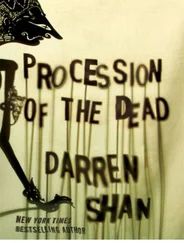Eugène would have preferred to go back to sleep. What on earth did this boisterous brute want with him in the middle of the night? But he had learned to be docile, and he would have meekly taken orders from the ship’s boy himself. He tumbled out of his hammock, and still half-asleep, he staggered after Nigger-Nicholas to the ladder leading to the hatchway.
In the pale rectangle of sky outlined by the half-open hatch, he could see that, contrary to what he had first thought, night was almost over.
He climbed the ladder and stepped out onto the deck.
Nigger-Nicholas, who was waiting there for him, was literally dancing with delight. With the triumphant expression of an artist unveiling his masterpiece, and a wide sweeping gesture that took in the whole stretch of the horizon, he showed him the dawn breaking over the ocean.
It was indeed an extraordinary sight.
The sky was divided between night and dawn — blue-black from the west to the zenith, pearl-white in the east — and was completely filled with the most fantastic cloud architecture one could possibly imagine. The night breeze had erected huge unfinished palaces, colonnades, towers, and glaciers, and then had abandoned this heavenly chaos in solemn stillness, to be a pedestal for the dawn. The highest crest of a windblown cumulus was already brushed with yellow, the first beam of daylight against the roof of fading night, whereas the lower regions of the clouds were still sunk in darkness, where one could vaguely make out deep gorges, shadowy peaks, rows of cliffs and blue chasms, nocturnal snowfields, and wide expanses of purple lava. The entire sky was caught in an interrupted surge of energy, frozen in motionless chaos. Above the smooth, translucent sea, everything was in a state of suspense, waiting for the sun.
Nigger-Nicholas, who was eagerly watching for the cabin hand’s reaction, was not disappointed. Under the spell of that extravagant splendor, so unexpectedly presented to him, Napoleon was momentarily made one with Eugène, reconciled with himself by the impact of an ecstasy that obliterated both his dream of glory and his present humiliating condition.
Nigger-Nicholas was usually quite indifferent to sunrises. However, he felt very pleased with the success of his initiative, and above all, he was proud of his own perspicacity. He had been able to pick out Napoleon from the common sailors, for whom he had nothing but contempt; from the beginning, he had guessed that this was a different breed of man — almost his equal. And now his diagnosis had been fully confirmed: the cabin hand had obviously not been brought up on the same diet of lard and moldy biscuit as those ignorant sailors.
Delighted with his own sagacity, Nigger-Nicholas did not even wait till the end of the show. He went down into the galley to prepare the breakfast coffee.
The sun had set all the clouds ablaze with light. As the smell of coffee rose from the galley, the morning watch came on deck; with great splashing of water and banging of buckets, the sailors began to swab the decks.
… The flamboyant mysteries of dawn had faded into the banality of plain day. The sky, which had earlier dominated everything with its overwhelming grandeur, was once more pale and distant, occupying its usual place in one half of the scenery, the other being filled by the monotonous sea, which sullenly rocked the Hermann-Augustus Stoeffer . The clouds which, by the end of the night, had climbed to the top of the sky had now scattered. The brightly painted giants of the dawn had shrunk and almost disappeared; all that remained of them were little white puffs straggling across the line of the horizon like grazing sheep.
The sky was clear; the breeze had died down. The Hermann-Augustus Stoeffer rolled heavily on the oily swell. A slack halyard drummed obstinately against the mast.
The heat began to rise. The new day had already grown stale: it had turned into an ordinary day at sea, blue and flat like any other.
Napoleon was carrying the breakfast tray to the officers’ mess room. He suddenly felt weak. He had been wounded by the dawn and his burden seemed so heavy. Nigger-Nicholas’s complicity had breached his defenses.
He wanted to be free of his debt to the cook. While polishing the brass in the captain’s cabin, he stole two cigars, intending to present them to Nigger-Nicholas. But he immediately felt ashamed of his action. Had he already sunk so low, he who used to grant licenses for entire tobacco shops with one stroke of the pen?
ON A COLD SPRING MORNING, out at sea off Bordeaux, a small lugger came alongside, bringing a message from the shipowners to the captain of the Hermann-Augustus Stoeffer .
The news quickly spread among the crew: the brig was to bypass Bordeaux and sail directly to Antwerp. The sailors, who were looking forward to going ashore, were disappointed at the thought that their voyage was going to last at least another week.
As for Napoleon, he was positively thunderstruck. Just when he was finally about to reach port, a mundane decision made by some vulgar shopkeeper, based on the price of molasses or indigo, suddenly barred his way. However, he soon regained his composure. The invisible hand that had unfailingly guided him to this point would surely be able to ward off this unexpected blow. New arrangements were certainly being made at this very moment, he thought, to ensure that the connection would be reestablished in Antwerp.
Alas! He was still unaware of the full extent of his misfortune!
A nasty nor’easter blew continuously during the last leg of the journey, forcing the brig to beat all the way. The weather was cold, all hands were constantly on deck, and the sailors were exhausted and soaked to the skin.
The Hermann-Augustus Stoeffer, which was a mediocre sailer to windward, took no less than ten days to reach the mouth of the river Scheldt, and for Napoleon these ten days proved more grueling than the whole of the ten months that had elapsed since his escape. Too long under pressure, his physical resistance suddenly gave way. His old stomach pains started up again, and for more than forty-eight hours he was unable to take any solid food.
The mouth of the river was marked by flat mudbanks whose blurry lines were barely visible on the horizon. The featureless landscape was drowned in intermittent rain squalls. The brig had to sail, now close to one bank, then to the other, following the invisible course of the main channel. Its meanders were known only to the pilot — a red-haired native who wore corduroy and wooden clogs like a farmer.
All through the months, Napoleon had waited with such fervent longing for this moment when he would finally see land again. His heart sank in disbelief as he stared at the gloomy banks, shrouded in gray, which bore no resemblance to anything he had imagined in his dreams of returning to France. Approaching this foreign shore, he felt as though he was beginning a new exile.
As the brig continued farther inland toward the port, the river became progressively narrower. One could now see the banks in more detail: muddy farms whose black thatch showed above the dikes, a red-brick church, forlorn windmills. This low, sodden countryside looked like some shapeless Patagonia lying in the desolation of an antipodean wasteland.
Napoleon’s consternation increased as he watched the landscape slowly unfolding. Overwhelming fatigue paralyzed his limbs. He felt old, sick, and lonely. Taking advantage of this immense weariness, the voice of cowardly, cynical Eugène whispered inside him, tempting him with words of abdication and surrender.
The brig came alongside the wharf.
His senses dulled by rain and exhaustion, he did not even recognize the Napoleon Basin, which he had personally inaugurated ten years earlier. In the meantime, it had been renamed Wilhelm Basin, in honor of some king of Holland.
Читать дальше












